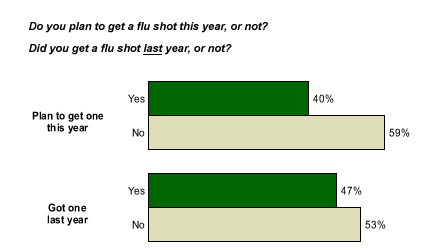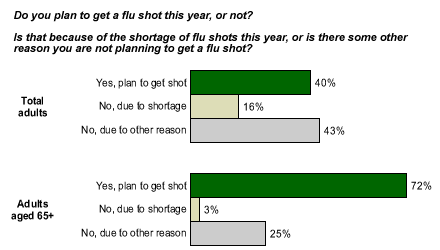Flu vaccine shortages this year may have left some healthcare providers and Americans feeling a little "sick" -- even before the flu season. British health officials announced Oct. 5 that they had suspended the license of vaccine-maker Chiron Corporation and barred the company from supplying 46 million to 48 million doses of flu vaccine originally targeted for the United States. Because this cut the expected U.S. supply of vaccine approximately in half, the U.S. Centers for Disease Control and Prevention is recommending that only high-risk groups be vaccinated.
In an Oct. 11-14 poll*, during the height of publicity about the impending vaccine shortage, Gallup asked Americans whether they intend to get a flu shot this year. Forty percent say they plan to get a flu shot this year, only slightly lower than the 47% who reported that they got a shot last year.

Impact of the Shortage
Overall, 59% of Americans say they will not get a flu shot this year -- but 87% of these people say they did not get a shot last year. Only 16% of Americans overall say that they are not getting a flu shot because of the shortage, while the remaining 43% are forgoing one for other reasons.
From a national health perspective, the best news in these numbers is that 72% of Americans aged 65 and older, one of the more vulnerable groups to the flu, intend to get a flu shot this year. Seventy-five percent of older Americans say they got a flu shot last year. Only 3% of those 65 and older say that they will not get a flu shot because of the shortage. Publicity about the shortage has not significantly deterred this high-risk group so far.

The CDC estimates that 60 million doses of flu vaccine will be available in the United States this flu season, and 42.8 million doses will be needed to accommodate everyone in groups particularly at risk for contracting influenza. It appears that older Americans are correct in their assumption that they should be able to get a flu shot this year if they desire one.
Bottom Line
The CDC has identified several "influenza vaccine shortage priority groups" that should get flu shots this year. In addition to seniors and children aged between 6 months and 23 months, these groups include pregnant women, people with certain chronic illnesses, healthcare personnel, and healthy adults who are household contacts for high-risk persons.
But what about people who aren't in any of the high-risk groups, but want to avoid contracting the flu this winter? CDC spokesperson Curtis Allen has some simple advice: "While influenza vaccination is the best method to prevent influenza, good health habits such as hand washing, covering coughs and sneezes, and avoiding persons who are sick can help limit the spread of this disease."
*Results are based on telephone interviews with 1,012 national adults, aged 18 and older, conducted Oct. 11-14, 2004. For results based on the total sample of national adults, one can say with 95% confidence that the margin of sampling error is ±3 percentage points.